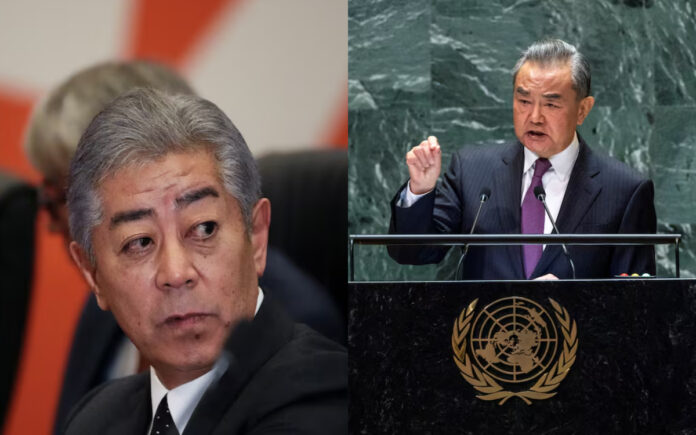Beijing: Japan’s Foreign Minister, Takeshi Iwaya, visited China on Wednesday, marking his first visit to Beijing since taking office in October. A key issue on the agenda is the resumption of seafood trade, which has been disrupted since Beijing imposed a ban in response to Tokyo’s release of treated radioactive wastewater from the Fukushima nuclear plant.
Iwaya is holding discussions with China’s Foreign Minister Wang Yi, as well as other senior Chinese officials. At the start of the meeting, Iwaya emphasized the importance of moving forward with concrete steps to enhance Japan-China relations.
“I believe it is important to have concrete and tangible examples of future possibilities of Japan-China ties,” Iwaya stated. “It is important for both Japan and China to fulfill responsibilities and move forward together in pursuit of the peace and prosperity of this region and the international community,” he added.
Wang Yi echoed the sentiment, underscoring that the relationship between the two countries holds significance beyond bilateral concerns. “If China-Japan relations are stable, Asia will be more stable,” Wang said.
A major challenge in the relationship has been Japan’s controversial discharge of treated wastewater from the Fukushima nuclear plant, which Beijing strongly opposed. In response, China tightened inspections on Japanese products, ultimately imposing a full ban on Japanese seafood last year. However, the two nations reached an agreement in September that outlined a path toward resuming seafood exports from Japan to China.
Recent reports from Japan’s Nikkei newspaper suggest that China is considering lifting the seafood import ban, but it remains contingent on Japan fulfilling its commitments to establishing an international monitoring system for the treated wastewater. “With sufficient monitoring, China will adjust relevant measures and gradually restore imports that meet standards and regulations,” said a Chinese foreign ministry spokesperson on Tuesday.
Also Read | Syria Issues Strong Warning to Iran Over Sovereignty and Stability
Iwaya’s visit is the first by a Japanese foreign minister to China since April of last year. During his stay, he is expected to raise concerns about Chinese military activities in the region, as well as discuss broader regional issues, including North Korea. Japan expressed “grave concern” over North Korea’s growing security alliance with Russia, which has included sending troops to support Russia’s war in Ukraine.
While security matters are critical, other discussions may center around people-to-people exchanges. In a bid to foster closer ties, China has expanded its visa-free arrangement with Japan until the end of 2025, a policy suspended during the COVID-19 pandemic. While Japan has not yet reciprocated with similar visa measures, China has expressed hope for further steps toward improving mutual exchanges.
Also Read | Archbishop of York Urges Change in Church of England Amid Safeguarding Failures
This one-day visit follows a commitment from both countries’ leaders to foster a mutually beneficial strategic relationship. Chinese President Xi Jinping emphasized last month that China and Japan should be “partners, not threats,” as relations between the two nations enter a “critical period of improvement and development.”
Despite their shared economic interests and close trade ties, Japan and China continue to navigate complex territorial disputes and historical sensitivities, making their relationship both challenging and crucial for regional stability.



